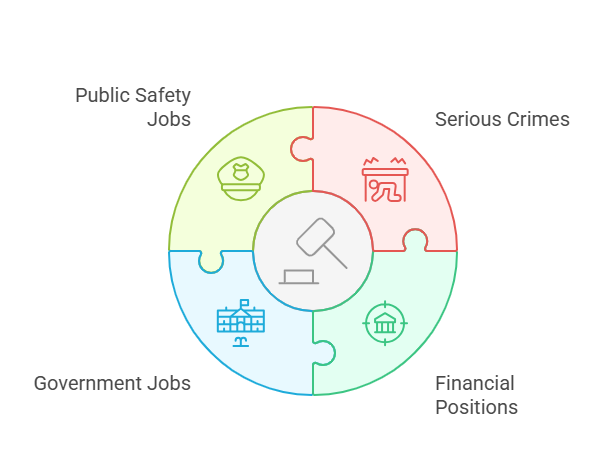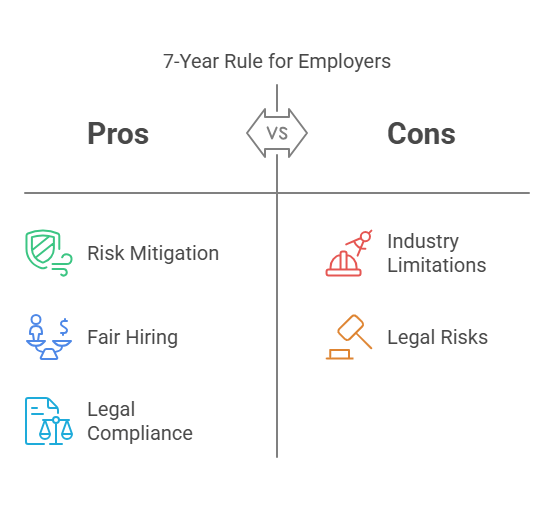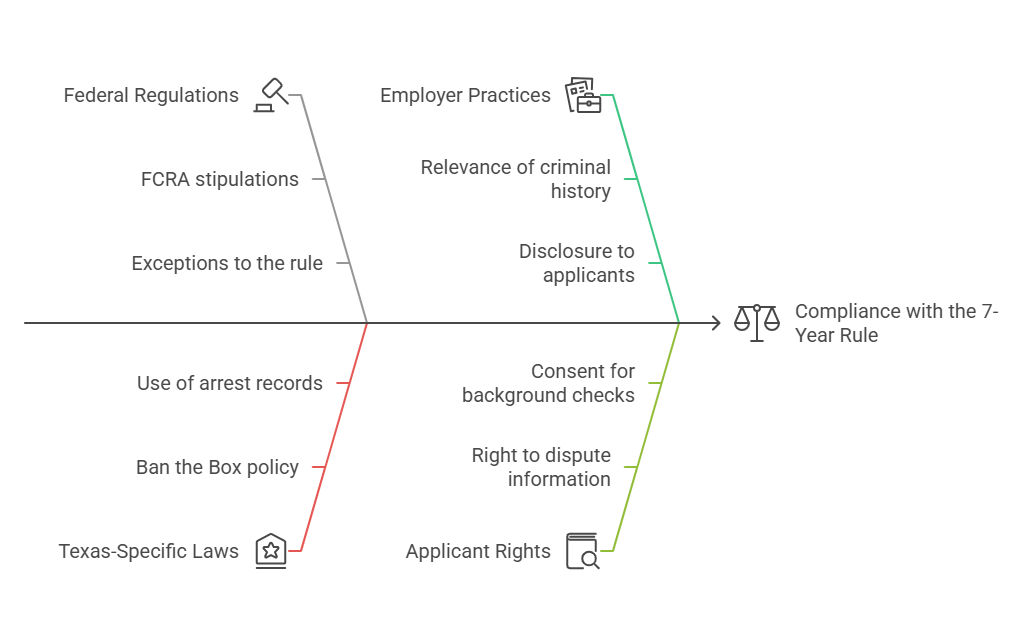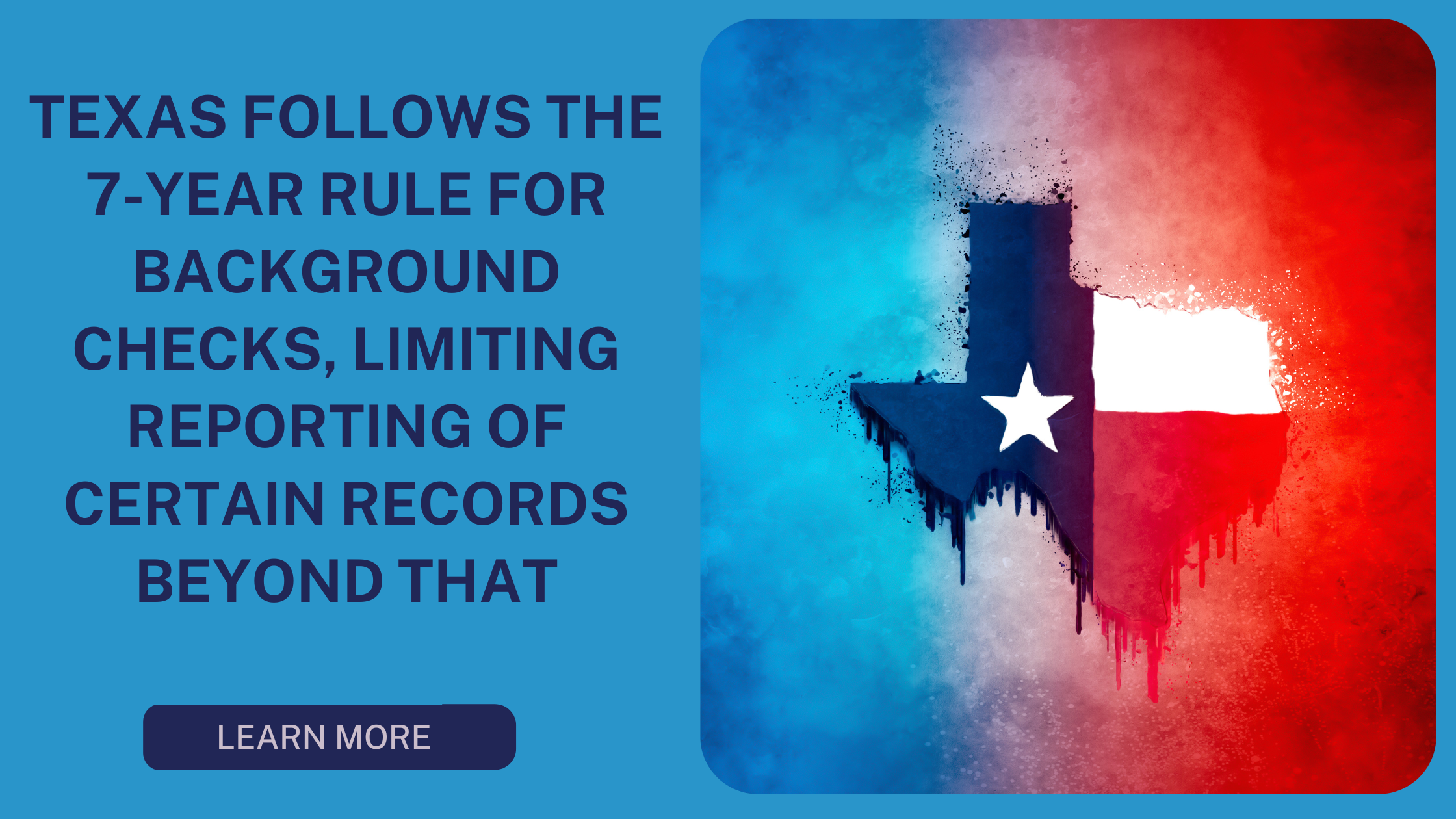Understanding the 7-Year Rule for Background Checks in Texas
Background checks are a fundamental part of the hiring process, and they play a significant role in ensuring that employers make informed decisions. However, the information that employers can consider in these checks is regulated by various laws, including the “7-year rule” in Texas. This rule limits the use of certain criminal history information in background checks. Understanding how this rule works is crucial for both job applicants and employers.
What Is the 7-Year Rule?
The 7-year rule refers to a guideline that restricts how far back certain criminal offenses can be included in a background check for employment purposes. Specifically, in Texas, this rule is primarily governed by the Fair Credit Reporting Act (FCRA), a federal law that sets limitations on the types of criminal history data that can be reported by background check agencies.
According to the FCRA, certain criminal convictions, such as felonies and misdemeanors, can only be reported if they occurred within the last seven years. For example, if a person has a felony conviction from 12 years ago, it should not be reported in an employment background check under normal circumstances, unless the crime falls under a specific exception.
Scope of the 7-Year Rule
The 7-year rule applies to criminal history, but it does not necessarily extend to all types of offenses. Specifically, the rule generally limits the reporting of misdemeanors and felonies that occurred more than seven years ago. There are, however, exceptions.
For instance, if a job applicant has been convicted of a serious offense such as murder or sexual assault, the 7-year rule may not apply. Serious crimes or convictions that involve major crimes can be reported regardless of the time that has passed. Additionally, certain positions or industries, like those in law enforcement or jobs requiring security clearance, may be exempt from the limitations of the 7-year rule.
Exceptions to the 7-Year Rule

Although the 7-year rule is a general guideline, exceptions exist. Some of the most notable exceptions include:
- Serious and Violent Crimes: Felonies involving serious offenses like murder, sexual assault, or child abuse may not be covered under the 7-year rule and can be reported indefinitely.
- Financial Positions: Jobs related to finance, banking, or fiduciary responsibilities may allow for the reporting of criminal history beyond the 7-year limit if the applicant’s background involves crimes related to dishonesty or financial misconduct.
- Government Jobs: Positions within the government, particularly federal positions, may require a more detailed criminal history report, and the 7-year rule may not apply.
- Public Safety and Law Enforcement: Jobs related to public safety, law enforcement, or positions requiring a high level of security clearance often do not adhere to the 7-year rule and can inquire about older convictions.
Compliance with the 7-Year Rule
Both employers and background check agencies must adhere to the guidelines set forth by the 7-year rule. Employers must ensure that they are not discriminating against applicants based on outdated or irrelevant criminal history. Failure to comply with the rule can lead to legal challenges and potential penalties.
What Applicants Need to Know
Job applicants in Texas should be aware of the 7-year rule when they undergo background checks. If a background check reveals a conviction older than seven years, applicants have the right to challenge the inclusion of this information. It is important for applicants to monitor their criminal records and understand their rights in relation to what can and cannot be disclosed during the hiring process.
Moreover, applicants should be aware that the 7-year rule does not necessarily mean that their entire criminal history will be excluded from a background check—only certain offenses within the 7-year period are limited in terms of how they can be used.
The Role of Background Check Agencies
Background check agencies play a crucial role in ensuring compliance with the 7-year rule. These agencies are responsible for gathering and reporting information related to criminal convictions, employment history, and other relevant data. It is essential that these agencies adhere to the FCRA guidelines and accurately report criminal records within the legal timeframes.
In Texas, background check agencies are required to remove or exclude certain information once it exceeds the 7-year limit, unless one of the exceptions applies. By working with professional background check services, employers can ensure that their hiring processes comply with state and federal laws.
In summary, the 7-year rule in Texas plays a significant role in shaping the hiring process by limiting how far back certain criminal offenses can be reported. Both employers and applicants must be aware of the rule’s implications and exceptions to avoid discrimination or potential legal issues. As background check agencies play a pivotal role in ensuring compliance, it is essential for employers to partner with reliable service providers to ensure that they are following the rules and protecting their businesses.
How the 7-Year Rule Affects Employers and Job Seekers in Texas
The 7-year rule has a significant impact on both employers and job seekers in Texas. Understanding how this rule operates can help employers comply with legal requirements while ensuring that hiring decisions are fair and based on accurate information. Job seekers, on the other hand, need to be aware of their rights and responsibilities under the 7-year rule. This section will explore in detail how the 7-year rule affects the hiring process, the types of crimes it impacts, and the key considerations for both employers and job seekers.
Impact of the 7-Year Rule on Employers
For employers, adhering to the 7-year rule is crucial for both compliance and fairness in the hiring process. When conducting background checks, employers must be mindful of the limitations imposed by the rule, which dictates how far back certain criminal offenses can be considered.

1. Risk Mitigation
One of the primary reasons employers conduct background checks is to mitigate the risks associated with hiring candidates who may have a criminal record. However, the 7-year rule limits the scope of the information available to employers. By excluding older criminal convictions (unless they fall under one of the exceptions), the rule helps employers focus on more recent, relevant criminal history, which may be more indicative of a candidate’s present risk to the company.
For instance, if an applicant has a conviction for a non-violent offense that occurred more than 7 years ago, the employer may not consider it when making a hiring decision. This reduces the possibility of unfair discrimination based on old or irrelevant convictions.
2. Fair Hiring Practices
The 7-year rule promotes fair hiring practices by preventing employers from using outdated or irrelevant criminal history to disqualify candidates. Before the implementation of rules like the 7-year rule, individuals with criminal records that dated back decades were often unfairly excluded from employment opportunities, even if they had demonstrated rehabilitation or reform.
Employers are now more likely to give candidates a second chance, particularly when the crime was minor or occurred a long time ago. This provides a more level playing field for job seekers, helping them secure employment despite past mistakes.
3. Compliance with State and Federal Laws
Employers in Texas must comply with both state and federal laws when conducting background checks. The 7-year rule is a crucial element of this compliance, and failure to adhere to it can lead to legal repercussions. If an employer violates the 7-year rule by considering criminal history that is older than 7 years, they could face lawsuits or penalties for unlawful discrimination.
Additionally, the Fair Credit Reporting Act (FCRA) mandates that employers must follow certain guidelines when using background checks in the hiring process. These guidelines ensure that background checks are used fairly and do not lead to discrimination based on outdated or irrelevant criminal history.
4. Specific Industries and Roles
While the 7-year rule applies broadly, certain industries and roles have unique requirements when it comes to criminal history. For example, positions that involve public safety, security, or fiduciary responsibilities often require more extensive background checks, and the 7-year rule may not apply in these contexts.
Employers in such fields may still need to consider older convictions or offenses related to financial misconduct, even if the conviction falls outside the 7-year window. Therefore, employers in these industries need to be aware of the specific legal requirements that apply to their hiring process.
Impact of the 7-Year Rule on Job Seekers
For job seekers, the 7-year rule offers a degree of protection by limiting the amount of criminal history that can be considered in a background check. However, it also places certain responsibilities on candidates to be honest and proactive about their criminal history when seeking employment.
1. Understanding What’s Reported
Job seekers in Texas should understand that not all criminal convictions are automatically excluded from background checks under the 7-year rule. While certain crimes may not appear if they occurred more than seven years ago, other convictions—particularly serious or violent offenses—may still be included in a background check, regardless of when they occurred.
In addition, job seekers should be aware that the rule primarily applies to background checks conducted by third-party agencies. If the employer is conducting a background check directly with a law enforcement agency, the employer may be able to access a broader range of information.
2. Importance of Disclosure
Even if a criminal conviction is older than 7 years, job seekers are still encouraged to be open and honest about their criminal history during the application process. Although employers are prohibited from considering certain offenses under the 7-year rule, being transparent can help build trust with potential employers.
Failure to disclose a criminal record, especially if the applicant is asked directly, can lead to disqualification from the hiring process, even if the conviction is technically excluded from the background check.
3. Rehabilitation and Demonstrating Change
For job seekers with older criminal convictions, the 7-year rule provides an opportunity to move forward without being penalized for past mistakes. Job seekers can demonstrate their rehabilitation and growth by highlighting their work history, volunteer experience, and any steps they’ve taken to improve themselves.
Employers are often willing to overlook past mistakes if they can see that the applicant has taken steps to turn their life around and has demonstrated good behavior since the conviction.
4. Disputing Errors on the Background Check
Job seekers also have the right to dispute any inaccuracies or errors on their background checks. If a conviction that should have been excluded under the 7-year rule appears, the applicant can take steps to correct the record. It’s important for job seekers to monitor their criminal history and request copies of background checks before applying for jobs to ensure that the information is accurate.
Types of Crimes Covered Under the 7-Year Rule:
| Type of Crime | Timeframe for Reporting | Exceptions |
|---|---|---|
| Felonies (Non-Violent) | Can be reported for up to 7 years | Violent crimes, financial crimes, or public safety roles may be exceptions |
| Misdemeanors | Can be reported for up to 7 years | Serious crimes may still be reported, regardless of the 7-year limit |
| Drug Offenses (Non-Violent) | Can be reported for up to 7 years | Exceptions may apply to high-risk industries or jobs involving safety |
| Violent Crimes | Can be reported beyond 7 years | Murder, sexual assault, etc., can be reported indefinitely |
| DUI/DWI Offenses | Can be reported for up to 7 years | May be reported beyond 7 years if related to public safety or driving positions |
This table provides a quick reference for employers and job seekers to understand which types of crimes are generally covered under the 7-year rule and the exceptions to the rule. It is essential for both parties to consider these factors during the background check process.
Rapid Hire Solutions and Compliance
Rapid Hire Solutions plays a crucial role in helping employers comply with the 7-year rule in Texas. As a provider of background check services, Rapid Hire Solutions ensures that employers receive accurate, timely, and legally compliant reports. Their services help employers avoid discrimination and legal pitfalls by ensuring that only the relevant criminal history is considered during the hiring process.
In addition, Rapid Hire Solutions helps job seekers by providing transparent and accurate background checks, enabling them to better understand their criminal history and how it may affect their job prospects. By partnering with RapidHireSolutions, employers can streamline their hiring process while maintaining compliance with Texas law.
Legal Aspects of the 7-Year Rule, FAQs, and Key Takeaways
When it comes to background checks in Texas, the 7-year rule plays a pivotal role in ensuring that applicants are not penalized for past mistakes that have long been corrected. This rule is tied closely to the Fair Credit Reporting Act (FCRA) and other state-specific regulations that govern how criminal history is reported. Understanding the legal implications of this rule is critical for both employers and job seekers, as it outlines clear boundaries regarding the disclosure of criminal convictions during the hiring process.
Legal Framework Surrounding the 7-Year Rule
The 7-year rule essentially restricts how far back criminal background information can be used by employers when making hiring decisions. This rule is a key component of the FCRA, which applies to all consumer background checks conducted by employers or third-party agencies.

Under federal law, the FCRA stipulates that criminal convictions (felonies and misdemeanors) should not appear on background reports after 7 years unless they meet certain conditions. Texas, in particular, follows this rule but has some exceptions that are worth noting. The Texas Labor Code specifically outlines additional protections for job applicants and states that employers cannot automatically reject candidates based solely on criminal history unless the offense directly impacts the job being applied for.
Additionally, the Texas Business and Commerce Code places emphasis on fair hiring practices, urging employers to assess criminal history on a case-by-case basis, considering factors such as the nature of the crime, the amount of time since the offense, and the relevance of the crime to the position applied for.
Employers must ensure that their hiring practices comply with both federal and state laws to avoid discrimination or bias. This includes ensuring that criminal records older than 7 years are not used inappropriately when evaluating job applicants, unless they fall under the exceptions laid out by the law.
The Fair Credit Reporting Act (FCRA) and How It Impacts Employers
The Fair Credit Reporting Act (FCRA) governs how background check companies report criminal history information and ensures that applicants’ rights are protected during the background check process. The FCRA limits the reporting period for most criminal convictions to 7 years, with exceptions for certain types of offenses.
- For Employers: The FCRA prohibits employers from using criminal records older than 7 years to make employment decisions, except in certain cases where the conviction is related to the position. For example, an applicant applying for a job that requires the handling of financial matters may still have their past financial crimes considered, even if they occurred more than 7 years ago.
- For Job Seekers: Under the FCRA, applicants must be informed if a background check is being conducted, and they must give their consent. Job seekers also have the right to dispute any inaccurate information on their report. Employers must provide applicants with a copy of the report if they decide not to hire based on the information contained within the background check.
Texas-Specific Laws and Restrictions
Texas also enforces its own rules regarding background checks and the use of criminal history in hiring decisions. Although Texas adheres to the FCRA‘s 7-year rule, the state adds its own set of guidelines that employers must follow. These laws are designed to ensure fairness and protect the rights of individuals with past criminal records.
- Ban the Box: Texas has implemented Ban the Box policies that restrict employers from asking about an applicant’s criminal history during the initial stages of the application process. Employers are prohibited from inquiring about a criminal record until after a conditional offer has been made. This helps ensure that individuals with criminal records are given an equal opportunity to be considered for a job without being immediately disqualified because of their past.
- Use of Arrest Records: Employers in Texas are not permitted to use arrest records alone when making hiring decisions. Arrests that did not lead to convictions should not be taken into account, and the Texas Fair Employment Act protects job seekers from discrimination based solely on arrest history.
- Exceptions to the 7-Year Rule in Texas: As previously mentioned, certain serious offenses may not be subject to the 7-year rule. For instance, crimes related to sexual offenses, fraud, or other violent crimes can be reported for a longer period, potentially indefinitely. Employers should be mindful of these exceptions when conducting background checks to ensure compliance with both Texas and federal laws.
Employer Best Practices for Complying with the 7-Year Rule
For employers conducting background checks in Texas, adhering to the 7-year rule is crucial to avoid legal pitfalls and ensure fairness in hiring practices. Below are some best practices that employers should follow:
- Stay Up-to-Date with Legal Changes: Since background check laws can evolve over time, employers should regularly review the FCRA and Texas-specific regulations to remain compliant with any legal changes related to criminal history reporting.
- Assess the Relevance of Criminal History: While employers can use criminal records when making hiring decisions, they should focus on the relevance of the crime to the position. A serious offense committed many years ago may not be relevant to a job that does not involve the same risks.
- Disclose Information to Applicants: If an employer decides not to hire a candidate based on a background check, they must inform the applicant of the decision. This includes providing them with a copy of the background check report and allowing the applicant to dispute any inaccuracies.
- Handle Criminal History with Sensitivity: Employers should be mindful of how they handle criminal history during the hiring process. It is important to evaluate the nature of the crime and the time elapsed since the conviction. Using criminal records as an automatic disqualifier can result in discrimination, especially if the offense is irrelevant to the position.
- Ensure Background Checks Are Conducted by Reputable Agencies: Employers should use reliable and compliant background check agencies to ensure that the information they receive is accurate and in line with Texas and federal laws. These agencies can also help employers understand the nuances of the 7-year rule and other legal requirements.
Frequently Asked Questions (FAQs)
Can an employer ask about criminal history beyond 7 years in Texas?
No, the 7-year rule limits the use of most criminal history information. However, serious crimes such as sex offenses or violent crimes can be reported beyond 7 years and used in hiring decisions.
What are the exceptions to the 7-year rule in Texas?
Serious offenses, such as violent crimes, sex crimes, or fraud, may be reported beyond 7 years. These crimes are considered relevant due to their potential impact on the safety and trust required for certain positions.
How does the 7-year rule impact background checks for housing or credit applications?
The 7-year rule also applies to background checks for housing or credit applications. Similarly, certain serious crimes can be reported beyond the 7-year limit in these contexts as well.
What should an applicant do if they believe an error exists on their background check?
Applicants can dispute inaccuracies directly with the background check agency. The agency is legally required to investigate and resolve any errors promptly.
What are the legal risks for employers violating the 7-year rule in Texas?
Employers who violate the 7-year rule could face legal repercussions, including lawsuits for discrimination or violation of the FCRA. They may also face reputational damage and penalties for non-compliance.
Conclusion
The 7-year rule in Texas background checks offers protection for job applicants while ensuring employers can still make informed decisions based on criminal history. By adhering to the rule and understanding its exceptions, both employers and job seekers can ensure a fair and legal hiring process. Employers should be proactive in keeping up with evolving laws and ensure compliance with regulations to avoid potential legal issues and discrimination claims.

